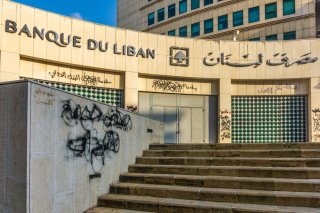Riad Salameh’s Era Has Ended: What Will Be His Legacy?
The end of Lebanon’s top central banker’s final term underscores the country’s economic woes.
On Monday, Lebanon’s Riad Salameh finally concluded his final six-year term as governor of the Bank of Lebanon after thirty years in office. After months of speculation on whether he would bow out, his deputy, Wassim Mansouri, announced Monday that he will assume responsibility over monetary policy until the appointment of a new governor. Widely viewed by the Lebanese as representative of the oligarchy that destroyed the country’s banking system and robbed them of their savings, Salameh leaves his post and Lebanon in financial ruin.
He was once hailed as the architect of Lebanon’s economic revival in the 2000s, shielding the economy from the disastrous effects of the 2008 financial crisis. Now, his reputation has fallen far from its original pedestal. There is little to say in the former governor’s defense. Salameh has been summoned multiple times by European courts in France and Germany on accusations of money laundering, tax evasion, and embezzlement. He is also under investigation at home for similar charges. However, the chances of the political class continuing to protect him from legal ramifications are high. On all accounts, he has failed to appear before a courtroom. The former governor denies all wrongdoings and vows to appeal.
Salameh was appointed governor in 1993 under the late Prime Minister Rafic Hariri, who was tasked with rebuilding Beirut and Lebanon after its fifteen years of civil war (1975–1990). As head of Banque du Liban (BDL), he was responsible for attracting foreign investment for reconstruction projects, building economic confidence, and strengthening the banking sector. Billions of dollars flowed through Lebanon, creating a boom in infrastructure development, and service activities like tourism and banking flourished. A widely shared illusion of good times reigned supreme. But under the veil of this newfound “prosperity,” Lebanon’s national debt rapidly compounded, reaching over 100 billion dollars in 2021 (500 percent of its GDP).
Lebanon’s debt soon created a financial crisis in 2019, leading to record inflation and the impoverishment of two-thirds of the country’s population. The same year saw Lebanese people from all walks of life descend on Martyr’s Square in downtown Beirut. Shouting “All of them means all of them,” the demonstrators expressed their desire to oust the politicians they blamed for failing to avert the economic collapse.
People in Lebanon demand better living standards after inflation sent them into free fall. The situation has become so desperate that some resorted to breaking into banks to reclaim their own money. Two weeks ago, a man entered a Byblos bank branch in the Beirut suburb of Sin el Fil. He raised his fist in the air while sitting on a table for the media to observe. The man shouted, “Beirut, rise up…revolution,” in reference to the 2019 protests. Despite the man’s appeal, mass demonstrations have largely ceased as people found ways to cope with the changing economic conditions.
By some metrics, Lebanon’s economy is improving. This summer may be a profitable one as two million tourists and expatriates flock to Beirut. Nightclubs, bars, restaurants, and tourist sites are, once again, alive and well. Ten billion dollars in foreign investment may fuel the service and leisure sectors. Nonetheless, wages are still low, and commodity prices are high. The state is non-existent as the government remains in a caretaker formation.
Today’s situation is bleak for most Lebanese, as the currency plummets to a 98 percent low against the dollar. Some independent members of Parliament spoke to me about what should be the appropriate measures taken against Salameh.
Deputy Najat Saliba said, “this person broke the law many times and should be in jail.” Her parliamentary colleague, Mark Daou, blames Salameh personally for the crisis: “He was the key architect and should be held accountable for the financial meltdown.”
Most Lebanese would agree that Salameh is responsible for the country’s economic failings. But his failure was also that of the broader political class, which presided over a grotesque national debt while doing nothing to alleviate it. Hence, the slogan “all of them means all of them” remains relevant today. A good leader leaves their institution and country in a better place than where they found it. Judging by this metric, Riad Salameh failed in his job, but the failure was not his alone.
Adnan Nasser is an independent foreign policy analyst and journalist with a focus on Middle East affairs. Follow him on Twitter @Adnansoutlook29.
Image: Shutterstock.

